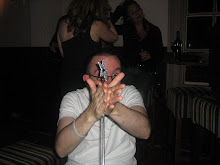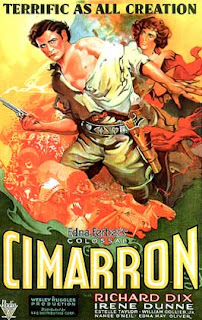As you know the way that I have set this challenge out is by Oscar Ceremony rather than by decade so the first ten films that I will encounter at the 1940 ceremony were actually released in 1939. But I've done it this way because of the way the first five ceremonies concentrated on films over two years. So here's a ceremony by ceremony breakdown of the decade that I've wrapped up.
Ceremony 1: 1929
Winner: Wings
Nominees I've Watched: Seventh Heaven and The Racket
Did the Right Film Win: Yes
The first year only three films were nominated and luckily I've been able to watch all three. While I didn't think much of The Racket, Seventh Heaven was a fairly good film however it felt a little disjointed and overall Wings had the better structure so it was the right choice to win the first Best Picture award.
Ceremony 2: 1930 (I)
Winner: The Broadway Melody
Nominees I've Watched: Alibi, Hollywood Revue of 1929 and In Old Arizona
Did The Right Film Win: Probably
The first of two ceremonies from 1930 and the first winner in sound. The Broadway Melody was by far the film that had the best structure however both Alibi and In Old Arizona played around with more filmic techinques. But overall I think Broadway Melody has stood the test of time out of the four I've watched. Meanwhile I will never get to see the filth film - The Patriot as their is no full print of the film.
Ceremony 3: 1930 (II)
Winner: All Quiet on The Western Front
Nominees I've Watched: The Big House, Disraeli, The Divorcee, The Love Parade
Did The Right Film Win: Yes
After the advent of sound the films at the third ceremony started to draw on contreversial themes such as what prison life was like - The Big House and the break up of marriages - The Divorcee. We also had biopics and Maurice Chevalier musicals but that year's eventual winner still stands up as one of the greatest war films of all time.
Ceremony 4: 1931
Winner: Cimarron
Nominees I've Watched: The Front Page and Skippy
Did The Right Film: Yes
As you've just read my review of Cimarron then you know there's not much choice in the way of an alternate winner. East Lynne and Trader Horn are the other two films that would be in contention but saying that I still think at the time with its epic backdrops and relevant themes - Cimarron would've been a hard film to beat.
Ceremony 5: 1932
Winner: Grand Hotel
Nominees I've Watched: Arrowsmith, Bad Girl, The Champ, One Hour With You, Shanghai Express, The Smiling Lieutenant
Not available to me: Five Star Final
Did the Right Film Win: Yes
The year that the number of nominees went up from five to eight. Although I did enjoy the realistic nature of Bad Girl, the father/son relationship in The Champ and the plotting of Shanghai Express, Grand Hotel was ably to do it on a bigger scale and had some topnotch performances to boot.
Ceremony 6: 1934
Winner: Cavalcade
Nominees I've Watched: 42nd Street, A Farewell to Arms, I Am A Fugitive From a Chain Gang, Lady for A Day, Little Women, The Private Life of Henry VIII and She Done Him Wrong
Not Available to Me: State Fair and Smilin' Through
Did The Right Film Win: Yes
Oscar took a year off and returned with two more nominees with the total going up to ten. Again two films stand out for me - I am A Fugitive and 42nd Street were both favourites of mine but the multi-layered narrative and historical accuracy of Cavlacade marked it out as an original piece of film-making and deserved of a best picture prize.
Ceremony 7: 1935
Winner: It Happened One Night
Nominees I've Watched: Cleopatra, The Gay Divorcee, Here Comes The Navy, The House of Rothschild, Imitation of Life, The Thin Man, Viva Villa
Not Available to Me: The Barretts of Wimpole Street, Fliration Walk, One Night of Love, The White Parade
Did the Right Film win: Yes
For those of you who can count 1935 gave us twelve nominees which was just a little bit silly as films such as the fluffy Gay Divorcee and offensive Here Comes the Navy made the cut. Claudette Colbert was in three of the films and although I really enjoyed Imitation of Life I will concede that It Happened One Night was the best over all.
Ceremony 8: 1936
Winner: Mutiny on The Bounty
Nominees I've Watched: Alice Adams, Captain Blood, David Copperfield, The Informer, The Lives of a Bengal Lancer, Les Miserables, A Midsummers Nights Dream, Naughty Marietta, Ruggles of Red Gap and Top Hat
Not Available To Me: Broadway Melody of 1936
Did the Right Film Win: Yes
Sticking with twelve nominees again saw a lot of musical and comic nonsense and some long sprawling epics make the cut. Mutiny on The Bounty wasn't a perfect picture but it was the best from this group of nominees
Ceremony 9: 1937
Winner: The Great Ziegfeld
Nominees I've Watched: Dodsworth, Libelled Lady, Mr Deeds Goes to Town, Romeo and Juliet, San Franscisco, The Story of Louis Pasteur, A Tale of Two Cities and Three Smart Girls
Not Available to Me: Anthony Adverse
Did The Right Film Win: No
Back to ten nominees we still have a couple of non-starters but a lot more strong contenders. Now that we're getting towards the end of the decade film making has become more elobarate as is seen in the adaptation of Romeo and Juliet and the disaster movie San Francisco as well as that year's winner The Great Ziegfeld. However I feel that Ziegfeld was too long and basically just a vaudeville stage show on the big screen. I think in terms of film-making both San Francisco and Dodsworth did it better and told a better story so, in my mind, one of those two films should've won.
Ceremony 10: 1938
Winner: The Life of Emile Zola
Nominees I've Watched: The Awful Truth, Captain Courageous, Dead End, In Old Chicago, Lost Horizon, One Hundred Men and A Girl, Stage Door and A Star is Born
Not Available To Me: The Good Earth
Did The Right Film Win: Yes
I wasn't sure about The Life of Emile Zola in terms of sustaining the narrative over the length of time the film was on screen. But it was a poor year in terms of nominees and only Stage Door and A Star is Born were on the same level but neither of those had the level of gravitas that Emile Zola had. I have a feeling however if I had watched The Good Earth that things might have been different but for now I'm saying that Zola was the right film to win.
Ceremony 11: 1939
Winner: You Can't Take It With You
Nominees I've Watched: The Adventures of Robin Hood, Boys Town, Four Daughters, La Grande Illusion, Jezebel, Pygmallion and Test Pilot
Not Available to Me: Alexander's Ragtime Band and The Citadel
Did The Right Film Win: No
As much as I enjoyed Frank Capra's second screwball comedy to win the Best Picture award I feel it didn't deserve Best Picture as much as two of the other films on the list. First of all The Adventures of Robin Hood which was the first film out of the ones I've watched that really knew what to do with the use of technicolour and was a very good swashbuckler. While La Grande Illusion was just a fantastically made piece of gripping film and one of Renoir's finest. When you've got two films that have defined the history of cinema a comedy about a rich and poor family doesn't really seem that important.
Okay so that's the twenties and thirties out of the way so lets start going with the films that won and were nominated in the ceremonies held between 1940 and 1949.
 tor and produced and directed the piece. Unlike a lot of the other films I'm not providing a plot synopsis here because most of you should know the story of Hamlet i.e. Danish prince tries to avenge the death of his father by his uncle, who then married his mother, by trying to get him to admit to the crime and then killing him himself. Obviously this being a tragedy the lion's share of the characters die one way or another, Hamlet's love Ophelia goes a bit potty and drowns herself, Hamlet's mum is poisoned and my favourite is Polonious who is stabbed while behind a curtain giving us the message that Peeping Toms never prosper. But adaptations of Shakespeare's plays should always be analysed by how they look visually. To some extent Olivier has done a good job the scene in which Hamlet writes a play basically about his uncle killing his father is done very well, with the space used for the play being particularly apt. The way this whole scene is lit is brilliant and some colour almost creeps into the scene also. The way that Hamlet's father's ghost is portrayed is also done very well with a suit of armour with a blacked out face surrounded by smoke creating a sense of fear. The filmic techniques also allow for some of the dialogue to be changed with Hamlet delivering some of his soliloquies in voice-over. On the whole though I did find the film was overly stagey and Olivier didn't quite utilitise all that was available to him in terms of filmic space. As there was so much oppourtunity to do something special I feel it was squandered and most of the scenes felt like they were simply being acted on the stage. I know its an adaptation but Olivier failed to make edits and almost 2 and a half hours it feels too long.
tor and produced and directed the piece. Unlike a lot of the other films I'm not providing a plot synopsis here because most of you should know the story of Hamlet i.e. Danish prince tries to avenge the death of his father by his uncle, who then married his mother, by trying to get him to admit to the crime and then killing him himself. Obviously this being a tragedy the lion's share of the characters die one way or another, Hamlet's love Ophelia goes a bit potty and drowns herself, Hamlet's mum is poisoned and my favourite is Polonious who is stabbed while behind a curtain giving us the message that Peeping Toms never prosper. But adaptations of Shakespeare's plays should always be analysed by how they look visually. To some extent Olivier has done a good job the scene in which Hamlet writes a play basically about his uncle killing his father is done very well, with the space used for the play being particularly apt. The way this whole scene is lit is brilliant and some colour almost creeps into the scene also. The way that Hamlet's father's ghost is portrayed is also done very well with a suit of armour with a blacked out face surrounded by smoke creating a sense of fear. The filmic techniques also allow for some of the dialogue to be changed with Hamlet delivering some of his soliloquies in voice-over. On the whole though I did find the film was overly stagey and Olivier didn't quite utilitise all that was available to him in terms of filmic space. As there was so much oppourtunity to do something special I feel it was squandered and most of the scenes felt like they were simply being acted on the stage. I know its an adaptation but Olivier failed to make edits and almost 2 and a half hours it feels too long.




















